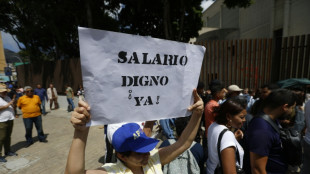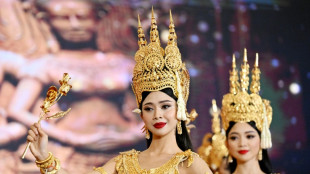
-
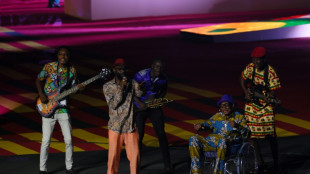 Music world mourns Ghana's Ebo Taylor, founding father of highlife
Music world mourns Ghana's Ebo Taylor, founding father of highlife
-
HK mogul's ex-workers 'broke down in tears' as they watched sentencing
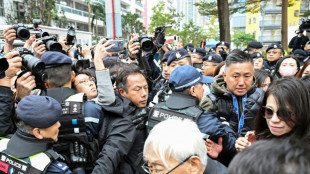
-
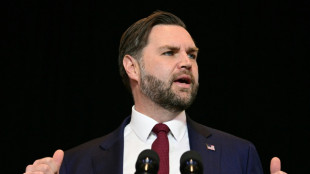 JD Vance set for Armenia, Azerbaijan trip
JD Vance set for Armenia, Azerbaijan trip
-
Sydney police deploy pepper spray as Israeli president's visit sparks protests
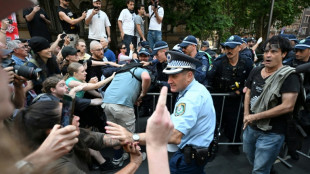
-
 EU warns Meta it must open up WhatsApp to rival AI chatbots
EU warns Meta it must open up WhatsApp to rival AI chatbots
-
Scotland spoil Italy's T20 World Cup debut with big win

-
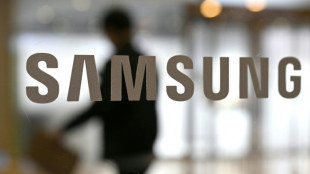 Stocks track Wall St rally as Tokyo hits record on Takaichi win
Stocks track Wall St rally as Tokyo hits record on Takaichi win
-
Israeli president says 'we will overcome evil' at Bondi Beach

-
 Munsey leads Scotland to 207-4 against Italy at T20 World Cup
Munsey leads Scotland to 207-4 against Italy at T20 World Cup
-
Venezuela's Machado says ally 'kidnapped' after his release
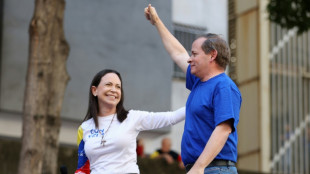
-
 Japan restarts world's biggest nuclear plant again
Japan restarts world's biggest nuclear plant again
-
Bangladesh poll rivals rally on final day of campaign

-
 Third impeachment case filed against Philippine VP Duterte
Third impeachment case filed against Philippine VP Duterte
-
Wallaby winger Nawaqanitawase heads to Japan

-
 Thailand's Anutin rides wave of nationalism to election victory
Thailand's Anutin rides wave of nationalism to election victory
-
Venezuela's Machado says ally kidnapped by armed men after his release

-
 Maye longs for do-over as record Super Bowl bid ends in misery
Maye longs for do-over as record Super Bowl bid ends in misery
-
Seahawks' Walker rushes to Super Bowl MVP honors

-
 Darnold basks in 'special journey' to Super Bowl glory
Darnold basks in 'special journey' to Super Bowl glory
-
Japan's Takaichi may struggle to soothe voters and markets

-
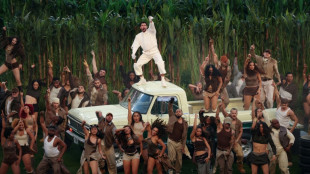 Bad Bunny celebrates Puerto Rico at Super Bowl, angering Trump
Bad Bunny celebrates Puerto Rico at Super Bowl, angering Trump
-
Seahawks soar to Super Bowl win over Patriots

-
 'Want to go home': Indonesian crew abandoned off Africa demand wages
'Want to go home': Indonesian crew abandoned off Africa demand wages
-
Asian stocks track Wall St rally as Tokyo hits record on Takaichi win

-
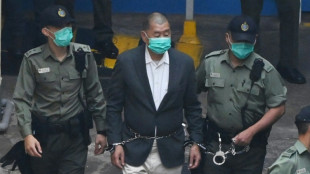 Hong Kong sentences pro-democracy mogul Jimmy Lai to 20 years in jail
Hong Kong sentences pro-democracy mogul Jimmy Lai to 20 years in jail
-
Bad Bunny celebrates Puerto Rico in joyous Super Bowl halftime show

-
 Three prominent opposition figures released in Venezuela
Three prominent opposition figures released in Venezuela
-
Japan PM Takaichi basks in historic election triumph
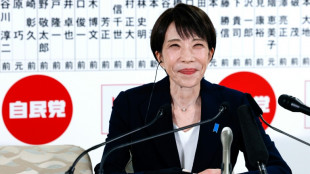
-
 Israeli president says 'we shall overcome this evil' at Bondi Beach
Israeli president says 'we shall overcome this evil' at Bondi Beach
-
'Flood' of disinformation ahead of Bangladesh election

-
 Arguments to begin in key US social media addiction trial
Arguments to begin in key US social media addiction trial
-
Gotterup tops Matsuyama in playoff to win Phoenix Open

-
 New Zealand's Christchurch mosque killer appeals conviction
New Zealand's Christchurch mosque killer appeals conviction
-
Leonard's 41 leads Clippers over T-Wolves, Knicks cruise

-
 Patriots-Seahawks Super Bowl approaches as politics swirl
Patriots-Seahawks Super Bowl approaches as politics swirl
-
Trump says China's Xi to visit US 'toward the end of the year'

-
 Real Madrid edge Valencia to stay on Barca's tail, Atletico slump
Real Madrid edge Valencia to stay on Barca's tail, Atletico slump
-
Malinin keeps USA golden in Olympic figure skating team event

-
 Lebanon building collapse toll rises to 9: civil defence
Lebanon building collapse toll rises to 9: civil defence
-
Real Madrid keep pressure on Barca with tight win at Valencia

-
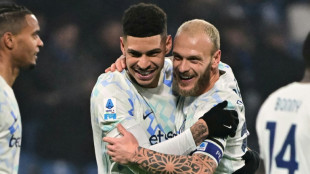 Dimarco helps Inter to eight-point lead in Serie A, Juve stumble
Dimarco helps Inter to eight-point lead in Serie A, Juve stumble
-
PSG trounce Marseille to move back top of Ligue 1

-
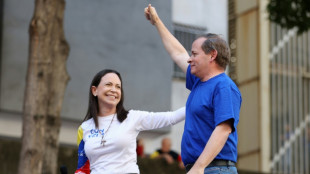 Two prominent opposition figures released in Venezuela
Two prominent opposition figures released in Venezuela
-
Hong Kong to sentence media mogul Jimmy Lai in national security trial

-
 Lillard will try to match record with third NBA 3-Point title
Lillard will try to match record with third NBA 3-Point title
-
Vonn breaks leg as crashes out in brutal end to Olympic dream

-
 Malinin enters the fray as Japan lead USA in Olympics team skating
Malinin enters the fray as Japan lead USA in Olympics team skating
-
Thailand's Anutin readies for coalition talks after election win

-
 Fans arrive for Patriots-Seahawks Super Bowl as politics swirl
Fans arrive for Patriots-Seahawks Super Bowl as politics swirl
-
'Send Help' repeats as N.America box office champ


'Existential war': Putin steels Russia for long conflict
When Russia introduced patriotism classes in primary and secondary schools last September, Tatyana Chervenko decided she was not going to peddle Kremlin "propaganda" to her eighth-grade students in Moscow.
The 49-year-old used some of the classes to teach maths instead and ignored talking points pushed by the Kremlin about the conflict raging in Ukraine.
Chervenko was motivated by her concern that authorities were using Soviet-style tools to foster patriotism and militarise society -- just weeks before the Kremlin announced the first army call-up since World War II.
Her act of protest did not go unnoticed.
The school administration formally reprimanded her twice, and in October masked men showed up at her work, bundled her into a police vehicle and detained her for several hours.
In December, after resisting mounting pressure from her employers, Chervenko was fired.
"They want to produce little soldiers. Some little soldiers will go to war, other little soldiers will make ammunition and a third group will develop software to support those efforts," Chervenko told AFP.
"They are playing a long game."
- 'Radical transformation' -
Political analysts and sociologists say that one year after Russian President Vladimir Putin ordered troops into Ukraine, the Kremlin is putting society on a war footing and digging in for a years-long conflict.
Putin delivered his New Year's Eve address this year surrounded by uniformed personnel, and rallied Russians behind the offensive in Ukraine and confrontation with the West.
Sociologist Grigory Yudin said the Kremlin was preparing Russians for a "major, existential war" and the education system was being leveraged to meet that goal.
"We are talking about a radical, complete transformation of education to mobilise Russian youth for war," Yudin told AFP.
"Right now education has two functions -- propaganda and basic military training."
The patriotism classes -- dubbed "Important Conversations" -- combine World War II revisionism, lessons on Russian values and the Kremlin's narrative about Moscow's troops "protecting" compatriots in Ukraine.
Schools have also been ordered to play the national anthem and hoist the flag at the start of each week.
The education ministry is expected in September to introduce courses in high schools and universities on handling Kalashnikov assault rifles and grenades, in an echo of Soviet times when these were curriculum staples.
Across Russia, schoolchildren are also being encouraged to send letters to Russian soldiers in Ukraine and make camouflage nets and candles for the trenches.
The government's sweeping campaign to boost patriotism within society is targeting adults, too.
Billboards hailing Russian soldiers and the letter Z -- Moscow's symbol for the assault -- are omnipresent across the country.
Putin has ordered cinema screenings of documentaries dedicated to the offensive in Ukraine.
And military journalists working for state media have gained celebrity status. One was selected to sit on the Kremlin's human rights council.
- 'Death cult' -
For years, Putin used World War II as a rallying cry for his political agenda, giving the Soviet Union's victory over Nazi Germany a cult-like status.
Now, state television and the Orthodox Church are building on that army pride and taking it to new heights.
"There is a glorification of war and elements of a death cult," Yudin said.
In September -- when Putin called up hundreds of thousands of reservists -- the head of the Russian Orthodox Church, Patriarch Kirill, said during a sermon that dying in Ukraine "washes away all sins".
One of the country's leading propagandists, Vladimir Solovyov, told Russians to stop fearing death.
"Life has been greatly overrated," he said on state television in January. "Why fear what's inevitable?"
For Andrei Kolesnikov, a senior fellow at the Carnegie Endowment for International Peace, these developments point to Russia's creeping return to totalitarianism.
The Kremlin's logic, Kolesnikov told AFP, is that "future generations should obediently implement the will of the state".
"This is no longer just an authoritarian state," he warned.
Sociologists say that the Kremlin's patriotic push is winning over many Russians, despite government plans to slash social spending and allocate an estimated third of the budget to defence and security this year.
- 'Military way of life' -
Putin supporter Nikolai Karputkin says he backs "the special military operation" in Ukraine, the Kremlin's official name for the conflict.
"We are at war with the West, with Western values, which they are trying to impose on us," Karputkin told AFP at a military-themed leisure park outside Saint Petersburg.
The 39-year-old -- who brought his family to the park, where children and their parents can ride battle tanks and handle weapons -- said he was also in favour of basic military training in schools.
"We have to boost patriotism," he said. "This is a good thing."
"We have to defend the traditional values and the sovereignty of our motherland."
Yudin, the sociologist, said Russian authorities would promote military and patriotic sentiment as long as they deemed necessary.
"The military way of life will last as long as Putin and his team are in the Kremlin," said Yudin.
"If they stay there for 20 years, then Russia will fight for 20 years."
C.Hamad--SF-PST


